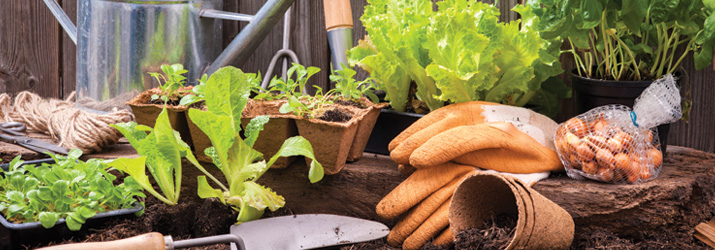National Institutes of Health Highlights the Benefits of Gardening

Have you started your summer garden yet? In a recent issue of NIH News in Health, the National Institutes of Health shared some information that might motivate you to rush right down to the nursery to pick up some seeds, seedlings, and gardening tools!
Is there anything more delicious and nutritious than vine-ripened tomatoes, just-harvested peaches and corn, or fresh herbs and spices? Growing your own edible plants—whether in a backyard garden or a few pots on your windowsill—can be fun, rewarding, and healthful. If you share your garden’s bounty with friends and neighbors, you might even expand your social connections and spread the health around.
“Gardening has many health benefits. It allows you to get outside, get active, and sit less, which might help to reduce stress,” says Dr. Philip Smith, a lifelong gardener who oversees obesity research at NIH.
Gardening can also help to improve your diet if you eat more fruits and vegetables. They’re especially delicious, with a more intense flavor, when ripe and freshly picked.
Fruits and vegetables are packed with fiber and essential vitamins and minerals. Research has shown that eating fruits and vegetables as part of an overall healthy diet can reduce your risk for long-term diseases, such as heart disease, stroke, and some types of cancer. The fiber in fruits and vegetables can help relieve constipation and normalize your bowel movements.
Fruits and vegetables may also help reduce your calorie intake—especially if they’re replacing high-calorie, high-fat foods—to help you control your weight. Herbs can add rich and interesting flavors to your meals without adding calories.
“Americans generally don’t eat enough fruits and vegetables; it’s one of the major drawbacks of our diets today,” says NIH’s Dr. Charlotte Pratt, who oversees research on nutrition, physical activity, and heart health.
The federal Dietary Guidelines for Americans published in 2015 recommends that adults who eat about 2,000 calories daily should eat about 2.5 cups of vegetables and 2 cups of fruit a day. But only a small percentage of us meet both fruit and vegetable recommendations.
When choosing vegetables, eat an assortment of colors and types every day. Broccoli, spinach, collard greens, kale, and other dark leafy greens are good choices. You might also choose red and orange vegetables, such as tomatoes, carrots, sweet potatoes, or red peppers. Many of these are easy to grow at home.
Gardening might enhance your mental health as well. Some studies have found that being physically active in natural environments—or even simple exposure to nature—can improve mood, reduce anxiety, and enhance self-esteem. “Growing your own vegetables and digging into the dirt can increase physical activity and give one a feeling of well-being and a sense of connection to the Earth,” Smith says.
If you think you don’t have space for a backyard garden, think again. “Some vegetables like carrots, lettuce, kale, and hot peppers don’t require much space,” says Smith. These can be grown in pots or in small gardens. “You can also try growing hanger tomatoes, which can be suspended from your deck or porch.”
Before you get started gardening, check out these garden safety tips, courtesy of the Centers for Disease Control and Prevention (CDC):
- GardeningWear gloves to avoid skin rashes, cuts, and contaminants.
- Read all instruction labels before using gardening chemicals, tools and other equipment, and keep them out of the reach of children.
- Cut your risk for sunburn and skin cancer by wearing wide-brimmed hats, sun shades, and sunscreen with sun protective factor (SPF) 15 or higher.
- Protect against diseases carried by mosquitoes and ticks. Use insect repellent. Wear long-sleeved shirts. Tuck pants into your socks.
- If you’re outside in hot weather, drink plenty of water.
- Pay attention to signs of heat-related illness, including high body temperature, headache, rapid pulse, dizziness, nausea, confusion, or unconsciousness. Seek emergency medical care if needed.
Source: National Institutes of Health News in Health, adapted by IlluminAge AgeWise.


